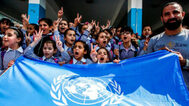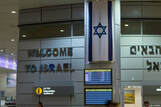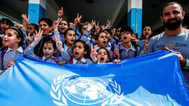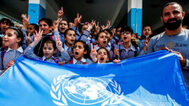21 dec 2019

The Swiss foreign ministry has lifted its temporary freeze on payments to UNRWA, the UN agency providing support for Palestinian refugees.
Switzerland had suspended payments to UNRWA in July following allegations of misconduct among its top management.
On Friday, the foreign ministry confirmed Swiss news reports that it had decided on December 12 to allocate CHF700,000 to ongoing UNRWA projects and CHF2 million to emergency aid programs in Syria and the occupied Palestinian territories.
“In view of the measures taken and the confirmation by the UN Secretary-General [Antonio Guterres] that no donor funds were misappropriated, the Swiss Agency for Development and Cooperation (SDC) decided to resume payments,” a Swiss foreign ministry spokesperson told swissinfo.ch.
Switzerland has been a member of the agency since its beginning in 1949 and had already allocated CHF22.3 million before the summer freeze.
In July, a confidential report by UNRWA’s ethics office alleged cases of mismanagement and abuse of power by a small group of senior officials who had allegedly circumvented UN control mechanisms.
Some of those allegations targeted UNRWA Commissioner-General Pierre Krahenbuhl, a Swiss national in charge at UNRWA since 2014, but he roundly rejected the charges and claimed that the investigation at the agency had cleared him of the accusations.
But he eventually resigned in November 2019, saying he had been a victim of serious political attacks. He referred specifically to undue pressure from a UN official in May, and hinted that this was part of a concerted effort to undermine UNRWA.
However, UNRWA continues to enjoy wide support from other countries. On December 13, the UN General Assembly overwhelmingly renewed its mandate for another three years by 169 votes in favor and nine abstentions, while the US and Israel voted against.
UNRWA provides education, health, housing and relief services to more than five million registered refugees in the West Bank, Gaza Strip and east Jerusalem, as well as in neighboring countries Jordan, Lebanon and Syria.
The agency has faced budgetary difficulties since last year, when the US - its biggest donor - halted its aid of $360 million per year. The US and Israel has been for a while trying to undermine its work as part of their efforts to end the issue of Palestinian refugees.
Switzerland had suspended payments to UNRWA in July following allegations of misconduct among its top management.
On Friday, the foreign ministry confirmed Swiss news reports that it had decided on December 12 to allocate CHF700,000 to ongoing UNRWA projects and CHF2 million to emergency aid programs in Syria and the occupied Palestinian territories.
“In view of the measures taken and the confirmation by the UN Secretary-General [Antonio Guterres] that no donor funds were misappropriated, the Swiss Agency for Development and Cooperation (SDC) decided to resume payments,” a Swiss foreign ministry spokesperson told swissinfo.ch.
Switzerland has been a member of the agency since its beginning in 1949 and had already allocated CHF22.3 million before the summer freeze.
In July, a confidential report by UNRWA’s ethics office alleged cases of mismanagement and abuse of power by a small group of senior officials who had allegedly circumvented UN control mechanisms.
Some of those allegations targeted UNRWA Commissioner-General Pierre Krahenbuhl, a Swiss national in charge at UNRWA since 2014, but he roundly rejected the charges and claimed that the investigation at the agency had cleared him of the accusations.
But he eventually resigned in November 2019, saying he had been a victim of serious political attacks. He referred specifically to undue pressure from a UN official in May, and hinted that this was part of a concerted effort to undermine UNRWA.
However, UNRWA continues to enjoy wide support from other countries. On December 13, the UN General Assembly overwhelmingly renewed its mandate for another three years by 169 votes in favor and nine abstentions, while the US and Israel voted against.
UNRWA provides education, health, housing and relief services to more than five million registered refugees in the West Bank, Gaza Strip and east Jerusalem, as well as in neighboring countries Jordan, Lebanon and Syria.
The agency has faced budgetary difficulties since last year, when the US - its biggest donor - halted its aid of $360 million per year. The US and Israel has been for a while trying to undermine its work as part of their efforts to end the issue of Palestinian refugees.
18 dec 2019
“This outcome confirms the international community’s trust in the ability of UNRWA to deliver on the critical mandate of protecting and providing essential services to the millions of Palestine refugees under its care in the West Bank, including East Jerusalem, Gaza, Lebanon, Jordan and Syria until a just and lasting solution is reached,” said Acting Commissioner-General of UNRWA, Mr. Christian Saunders.
The Agency provides services in the fields of health, education, microfinance, infrastructure and camp improvement, protection and relief and social services, with over half a million girls and boys attending its 709 schools and some 8.5 million patient visits provided in 2018 alone in 22 health centers across the five fields of operations.
The vote is seen as a confirmation of the strong support that Member States have for UNRWA, the stability its services bring to millions of people across the Middle East, and its efficiency in the face of shrinking financial support, partly as a result of a decision by the Agency’s largest donor to cut its funding in 2018.
“We are extremely grateful to UN Member States for this overwhelming vote of confidence in the Agency,” said Mr. Saunders. “Now, we need them to step up their assistance and make available the necessary resources that will enable us to implement the mandate that they have given us.”
The Agency provides services in the fields of health, education, microfinance, infrastructure and camp improvement, protection and relief and social services, with over half a million girls and boys attending its 709 schools and some 8.5 million patient visits provided in 2018 alone in 22 health centers across the five fields of operations.
The vote is seen as a confirmation of the strong support that Member States have for UNRWA, the stability its services bring to millions of people across the Middle East, and its efficiency in the face of shrinking financial support, partly as a result of a decision by the Agency’s largest donor to cut its funding in 2018.
“We are extremely grateful to UN Member States for this overwhelming vote of confidence in the Agency,” said Mr. Saunders. “Now, we need them to step up their assistance and make available the necessary resources that will enable us to implement the mandate that they have given us.”
16 dec 2019

Israel is preparing to claim a total of $150 billion in compensation for the property of Jews who migrated from Arab countries to occupied Palestine, Israel Today has reported.
The process of estimating the property values started in 2002, the newspaper pointed out. It noted that the law to claim compensation for Arab Jews was passed by the Israeli parliament in 2010 as a condition of a regional peace deal; negotiations began with the Arab countries in 2017.
According to media reports, the compensation claimed will include assets from Iraq, Iran, Syria, Yemen, Egypt, Morocco, Tunisia and Libya. In January, Israel was reportedly planning to seek an estimated $250 billion from Arab countries after the government in Tel Aviv quietly conducted some research on the value of property and assets that the Jews left behind.
Justice for Jews from Arab Countries, an international parent group of Jewish organisations, claims that around 856,000 Jews from 10 Arab countries — including Algeria and Lebanon — fled or were expelled during the 1948 Nakba, when 800,000 Palestinians were expelled and 532 villages were destroyed by the creation of the State of Israel.
According to Russian broadcaster RT, former British MP George Galloway denounced the Israeli move for compensation. “Israel bombed and destroyed the nuclear reactors in Iraq some 25-30 years ago. Is Iraq going to be compensated by Israel for that?” the pro-Palestinian Galloway asked.
“Israel occupied and has annexed a part of Syria — the Golan Heights — and it is harvesting oil there as we speak. Is Israel going to compensate Syria for that?”
Citing Libya and Iran as examples, he added that some of these countries have got funds frozen in the United Sates. “Israel could seek to claim these funds by going to US courts. The whole thing would be laughable if it were not for this fact.”
In the coming weeks, said Maan News Agency, it is expected that the compensation project will be presented to Israeli Prime Minister Benjamin Netanyahu.
The process of estimating the property values started in 2002, the newspaper pointed out. It noted that the law to claim compensation for Arab Jews was passed by the Israeli parliament in 2010 as a condition of a regional peace deal; negotiations began with the Arab countries in 2017.
According to media reports, the compensation claimed will include assets from Iraq, Iran, Syria, Yemen, Egypt, Morocco, Tunisia and Libya. In January, Israel was reportedly planning to seek an estimated $250 billion from Arab countries after the government in Tel Aviv quietly conducted some research on the value of property and assets that the Jews left behind.
Justice for Jews from Arab Countries, an international parent group of Jewish organisations, claims that around 856,000 Jews from 10 Arab countries — including Algeria and Lebanon — fled or were expelled during the 1948 Nakba, when 800,000 Palestinians were expelled and 532 villages were destroyed by the creation of the State of Israel.
According to Russian broadcaster RT, former British MP George Galloway denounced the Israeli move for compensation. “Israel bombed and destroyed the nuclear reactors in Iraq some 25-30 years ago. Is Iraq going to be compensated by Israel for that?” the pro-Palestinian Galloway asked.
“Israel occupied and has annexed a part of Syria — the Golan Heights — and it is harvesting oil there as we speak. Is Israel going to compensate Syria for that?”
Citing Libya and Iran as examples, he added that some of these countries have got funds frozen in the United Sates. “Israel could seek to claim these funds by going to US courts. The whole thing would be laughable if it were not for this fact.”
In the coming weeks, said Maan News Agency, it is expected that the compensation project will be presented to Israeli Prime Minister Benjamin Netanyahu.

The Qatar Fund for Development (QFFD) and the United Nations Relief and Works Agency for Palestine Refugees in the Near East (UNRWA) signed an agreement today, under which the State of Qatar will contribute US$ 20.7 million to support the access of Palestine refugees to basic services in Syria.
With this generous contribution, the total support provided QFFD to UNRWA during the year 2019 amounts to US$ 40 million.
The agreement was signed by His Excellency, Mr. Khalifa bin Jassim Al-Kuwari, Director General of QFFD, and Acting UNRWA Commissioner-General, Mr. Christian Saunders.
The donation will directly contribute to the Agency’s education programme, namely by supporting basic education services for students and vocational and technical education and training courses for young Palestine refugee men and women. It will also support the provision of basic health services to 445,000 Palestine refugees in Syria.
“The State of Qatar and the Qatar Fund for Development are demonstrating once again their commitment to supporting Palestine refugees,” said Acting UNRWA Commissioner-General Saunders.
“This generous donation to the UNRWA operations and activities in Syria comes at a time of intense financial challenge for the Agency. We are truly grateful for this additional funding and look forward to further expanding the cooperation between UNRWA, the QFFD and the State of Qatar in 2020 and beyond.”
PNN reports that in 2018, Qatar contributed US$ 50 million, making it one of the Agency’s top ten donors last year. Qatar’s timely contribution allowed the Agency to open its schools on time for some 530,000 boys and girls in 711 UNRWA schools.
His Excellency, Mr. Khalifa bin Jassim Al-Kuwari, said: “This agreement is an affirmation of the steadfast and firm position of the State of Qatar regarding the Palestinian issue and the State of Qatar’s special interest in the education and health sector, believing in their importance and their role in building a decent life for brothers in Palestine.
“Furthermore, the leadership of the State of Qatar has exerted significant efforts in development and humanitarian aid sectors in order to serve the Palestinian people in a sustainable manner.” His Excellency added, “We support the pivotal role played by UNRWA and we are confident that UNRWA will use these resources in the optimally.”
With this generous contribution, the total support provided QFFD to UNRWA during the year 2019 amounts to US$ 40 million.
The agreement was signed by His Excellency, Mr. Khalifa bin Jassim Al-Kuwari, Director General of QFFD, and Acting UNRWA Commissioner-General, Mr. Christian Saunders.
The donation will directly contribute to the Agency’s education programme, namely by supporting basic education services for students and vocational and technical education and training courses for young Palestine refugee men and women. It will also support the provision of basic health services to 445,000 Palestine refugees in Syria.
“The State of Qatar and the Qatar Fund for Development are demonstrating once again their commitment to supporting Palestine refugees,” said Acting UNRWA Commissioner-General Saunders.
“This generous donation to the UNRWA operations and activities in Syria comes at a time of intense financial challenge for the Agency. We are truly grateful for this additional funding and look forward to further expanding the cooperation between UNRWA, the QFFD and the State of Qatar in 2020 and beyond.”
PNN reports that in 2018, Qatar contributed US$ 50 million, making it one of the Agency’s top ten donors last year. Qatar’s timely contribution allowed the Agency to open its schools on time for some 530,000 boys and girls in 711 UNRWA schools.
His Excellency, Mr. Khalifa bin Jassim Al-Kuwari, said: “This agreement is an affirmation of the steadfast and firm position of the State of Qatar regarding the Palestinian issue and the State of Qatar’s special interest in the education and health sector, believing in their importance and their role in building a decent life for brothers in Palestine.
“Furthermore, the leadership of the State of Qatar has exerted significant efforts in development and humanitarian aid sectors in order to serve the Palestinian people in a sustainable manner.” His Excellency added, “We support the pivotal role played by UNRWA and we are confident that UNRWA will use these resources in the optimally.”
11 dec 2019

(photo: Palestinians are expelled from their homes at gunpoint during the Nakba of 1948.)
Palestinian BDS National Committee (BNC) / Palestine
On the anniversaries of the Universal Declaration of Human Rights and UN Resolution 194 affirming Palestinian refugees’ right to return to their homes, the BDS movement insists on “the full menu of rights” for the indigenous Palestinians.
Exactly 71 years ago, the United Nations General Assembly (UNGA) adopted the Universal Declaration of Human Rights (UDHR), whose preamble states that “the recognition of the inherent dignity and of the equal and inalienable rights of all members of the human family is the foundation of freedom, justice and peace in the world.” Anchored in this historic declaration, the BDS movement rejects racism and discrimination in all forms and aspires to achieve the Palestinian people’s “full menu of rights.”
For the absolute majority of the indigenous people of Palestine the most important right on that “menu” is the right of our refugees to return to their homes and lands of origin, from which they were ethnically cleansed by Zionist militias, and later the Israeli army, during the 1948 Nakba.
“I am not interested in picking up crumbs of compassion thrown from the table of someone who considers himself my master. I want the full menu of rights.” — Archbishop emeritus Desmond Tutu
This right, which was explicitly adopted in UNGA Resolution 194 merely one day after the UNGA adopted the Universal Declaration of Human Rights, has a solid foundation in that Declaration. It is also enshrined in the 1966 International Covenant on Civil and Political Rights (ICCPR) and other tenets of international law.
The ethnic cleansing of Palestine has continued over the last seven decades, amounting to an ongoing Nakba. Today, more than 68% of the people of Palestine are refugees or internally displaced persons, denied their basic right to return home by Israel’s far-right regime of military occupation, settler-colonialism and apartheid.
This is precisely why the BDS Call, issued by the largest coalition in Palestinian society in 2005, insists on the right of Palestinian refugees to return to their homes and lands, along with the right to live free from foreign occupation and apartheid.
Anti-Palestinian arguments that reject the Palestinian refugees’ inalienable right to return are racist, as they dehumanize Palestinians, denying us what is due to all other humans. They are directly or indirectly intended to maintain Israel’s status as an apartheid “Jewish state” with dozens of racist laws that serve to racially dominate and discriminate against the indigenous Palestinians. Every morally-consistent human rights defender should condemn such racism and ethnic supremacy without reservation.
Seventy one years after the UDHR and UNGA Resolution 194, what is needed is accountability to international law and effective pressure to dismantle Israel’s regime of colonial subjugation and apartheid, including the decades-long denial of our refugees’ rights. Boycotting Israeli and international companies and banks, as well as academic and cultural institutions, that are complicit in Israel’s war crimes and crimes against humanity is more crucial than ever. Divesting from multinationals that support Israeli apartheid is a moral and legal obligation, not a charitable act.
Imposing a military embargo on Israel’s far-right regime, as was done against apartheid South Africa, is urgently called for, not just for the sake of Palestinians, but also for the sake of all oppressed communities worldwide. Israel’s “field-tested” military doctrines, weapons and “security” systems are playing a major role in the crimes — including genocide and ethnic cleansing — perpetrated by despotic and murderous regimes in Africa, Latin America, South Asia, the Arab world and elsewhere.
The BDS logic of nonviolent pressure, accountability and moral consistency is needed now more than ever in pursuit of what the UDHR aimed to achieve–freedom, justice, dignity and peace. After all, everyone is entitled to the full menu of human rights.
Palestinian BDS National Committee (BNC) / Palestine
On the anniversaries of the Universal Declaration of Human Rights and UN Resolution 194 affirming Palestinian refugees’ right to return to their homes, the BDS movement insists on “the full menu of rights” for the indigenous Palestinians.
Exactly 71 years ago, the United Nations General Assembly (UNGA) adopted the Universal Declaration of Human Rights (UDHR), whose preamble states that “the recognition of the inherent dignity and of the equal and inalienable rights of all members of the human family is the foundation of freedom, justice and peace in the world.” Anchored in this historic declaration, the BDS movement rejects racism and discrimination in all forms and aspires to achieve the Palestinian people’s “full menu of rights.”
For the absolute majority of the indigenous people of Palestine the most important right on that “menu” is the right of our refugees to return to their homes and lands of origin, from which they were ethnically cleansed by Zionist militias, and later the Israeli army, during the 1948 Nakba.
“I am not interested in picking up crumbs of compassion thrown from the table of someone who considers himself my master. I want the full menu of rights.” — Archbishop emeritus Desmond Tutu
This right, which was explicitly adopted in UNGA Resolution 194 merely one day after the UNGA adopted the Universal Declaration of Human Rights, has a solid foundation in that Declaration. It is also enshrined in the 1966 International Covenant on Civil and Political Rights (ICCPR) and other tenets of international law.
The ethnic cleansing of Palestine has continued over the last seven decades, amounting to an ongoing Nakba. Today, more than 68% of the people of Palestine are refugees or internally displaced persons, denied their basic right to return home by Israel’s far-right regime of military occupation, settler-colonialism and apartheid.
This is precisely why the BDS Call, issued by the largest coalition in Palestinian society in 2005, insists on the right of Palestinian refugees to return to their homes and lands, along with the right to live free from foreign occupation and apartheid.
Anti-Palestinian arguments that reject the Palestinian refugees’ inalienable right to return are racist, as they dehumanize Palestinians, denying us what is due to all other humans. They are directly or indirectly intended to maintain Israel’s status as an apartheid “Jewish state” with dozens of racist laws that serve to racially dominate and discriminate against the indigenous Palestinians. Every morally-consistent human rights defender should condemn such racism and ethnic supremacy without reservation.
Seventy one years after the UDHR and UNGA Resolution 194, what is needed is accountability to international law and effective pressure to dismantle Israel’s regime of colonial subjugation and apartheid, including the decades-long denial of our refugees’ rights. Boycotting Israeli and international companies and banks, as well as academic and cultural institutions, that are complicit in Israel’s war crimes and crimes against humanity is more crucial than ever. Divesting from multinationals that support Israeli apartheid is a moral and legal obligation, not a charitable act.
Imposing a military embargo on Israel’s far-right regime, as was done against apartheid South Africa, is urgently called for, not just for the sake of Palestinians, but also for the sake of all oppressed communities worldwide. Israel’s “field-tested” military doctrines, weapons and “security” systems are playing a major role in the crimes — including genocide and ethnic cleansing — perpetrated by despotic and murderous regimes in Africa, Latin America, South Asia, the Arab world and elsewhere.
The BDS logic of nonviolent pressure, accountability and moral consistency is needed now more than ever in pursuit of what the UDHR aimed to achieve–freedom, justice, dignity and peace. After all, everyone is entitled to the full menu of human rights.

